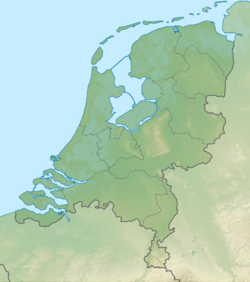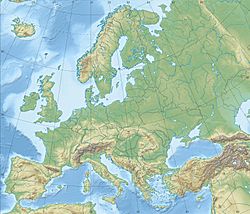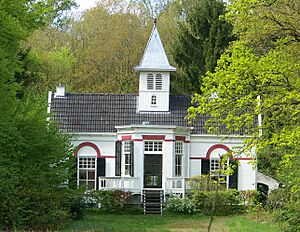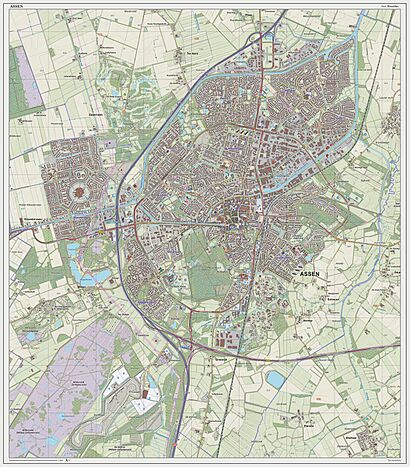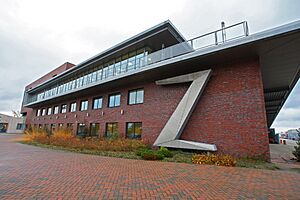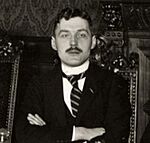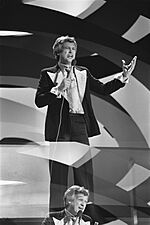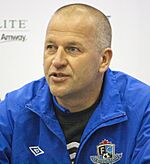Assen facts for kids
Quick facts for kids
Assen
|
|||||
|---|---|---|---|---|---|
|
City and municipality
|
|||||
|
Market square in the city center
Drents Museum
Jozefkerk
Canal De Vaart
|
|||||
|
|||||
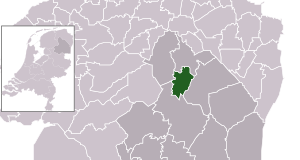
Location in Drenthe
|
|||||
| Country | Netherlands | ||||
| Province | Drenthe | ||||
| Government | |||||
| • Body | Municipal council | ||||
| Area | |||||
| • Total | 83.45 km2 (32.22 sq mi) | ||||
| • Land | 81.94 km2 (31.64 sq mi) | ||||
| • Water | 1.51 km2 (0.58 sq mi) | ||||
| Elevation | 10 m (30 ft) | ||||
| Population
(May 2014)
|
|||||
| • Total | 67,329 | ||||
| Demonyms | Assenaar, Asser | ||||
| Time zone | UTC+1 (CET) | ||||
| • Summer (DST) | UTC+2 (CEST) | ||||
| Postcode |
9400–9409, 9486–9489, 9492
|
||||
| Area code | 0592 | ||||
Assen is a city and municipality in the northeastern Netherlands. It is the capital city of the province of Drenthe. Assen became an official city in 1809.
The city is famous for the TT Circuit Assen. This is a special track for motorcycle racing. The exciting Dutch TT race happens there every year in June. Assen also hosts an annual Dance Festival.
Contents
Exploring the History of Assen
The story of Assen began a long time ago, around 1258. At that time, a group of nuns needed a new home for their abbey. Their first abbey was built as a punishment after a big battle. It was in a wet, boggy area. So, they looked for a better, drier place.
They found a good spot in an area called Witten. Only a few farms were there back then. The new abbey was built in the 1260s. Over many years, the city of Assen grew around this abbey.
The Old Abbey and Its Legacy
The abbey was built where the Brink (a central grassy area) of Assen is today. Now, the Drents Museum stands on the abbey's old site. It was built in 1882.
Only the abdijkerk (abbey church) and parts of the old walls remain. They remind us of the city's religious beginnings.
Assen's Coat of Arms
The city's coat of arms comes from the abbey's old seal. It shows Mary with her child, Jesus. This image is also on the coat of arms for the province of Drenthe.
Around the year 1600, the abbey's property became government property. The abbey itself stopped existing, but its buildings remained. Because Assen was in a central location, it became the main place for the provincial government. This made Assen the capital of Drenthe.
Becoming a City
Assen officially became a city in 1809. King Louis Napoleon gave Assen its city rights. He had big plans for the village to grow into a major city. However, his plans were stopped when the Netherlands became part of the French Empire.
As a government center, Assen attracted wealthy people and new businesses. This helped the city grow slowly but steadily. New things arrived, like a newspaper in 1823 and a Latin school in 1825. A postal service to Groningen started in 1830.
The city also got a court in 1840 and a railway station in 1870. A very important achievement was the Drentse Hoofdvaart canal. This canal was used to transport peat and other goods. Many of the city's most important buildings are from the 1800s.
Industrial Growth and Modern Assen
Around 1900, Assen started to become more industrial. It was mostly a place for government workers before. But new factories, like a slaughterhouse and a dairy, helped the city grow in different ways.
By 1930, Assen also became a key center for healthcare in the province. This was due to the establishment of various hospitals.
After World War II, Assen had about 20,000 people. The famous Assen TT race helped make the city known. But it was in the 1950s that Assen really started to grow quickly. The Dutch Oil Company (Nederlandse Aardolie Maatschappij) set up in the city.
Today, Assen is known for its TT race and is one of the fastest-growing cities in the northern Netherlands. It has many job opportunities, especially in the service industry. The city is growing fast with new houses and people.
Assen is also very bicycle-friendly. Its city center is closed to cars, except for emergency vehicles. It has many special paths for bikes. About 41% of all trips in Assen are made by bicycle! The city has been improving its cycling paths since the 1960s.
Tourism, Culture, and Sports in Assen
The Famous TT Circuit Assen
The TT Circuit Assen is one of the most famous motorcycle racing tracks in the world. It is the only circuit that has been part of the MotoGP calendar since it began in 1949. People often call it the "Cathedral of Motorcycle Racing."
Discovering the Drents Museum
The Drents Museum offers a look at the world and at the history of Drenthe. It tells stories about old discoveries (archaeology), art, and history.
The Yde Girl: A Peat Bog Mystery
The Drents Museum is home to the Yde Girl. She was a teenager, about 140 cm tall, with blond hair. One side of her head was shaved before she died. She lay in a peat bog near the village of Yde for almost 2,000 years.
Two workers found her in May 1897. They were very scared and ran away! Days later, most of her body parts and pieces of a cloak were pulled from the peat. Sadly, villagers had heard about the find and secretly took many of her teeth and most of her hair.
Dance Festival in Assen
Every November, Assen becomes a center for international dance. The city hosts the Assen Dance Festival. This event includes the Dutch Open Championships for Ballroom and Latin American dancers. Dancers from all over the world can join this open competition.
Cycling in the Capital of Drenthe
Assen is the capital of Drenthe, which is known as the "cycling province" of the Netherlands. There are many excellent cycle paths in and around the city. Assen also hosts regular cycling events. These include the Drentse fietsvierdaagse and the Jeugdtour.
In 2009, a big cycling race called the Vuelta a España started in Assen. The city has also hosted the International Six Days Enduro motorcycle event twice.
Assen's Football Club
Asser Christelijke Voetbalvereniging is a football club founded in 1939. It is one of the most successful amateur football clubs in the Netherlands.
Education in Assen
Assen is home to the Drenthe College, which offers secondary vocational education (MBO). This school has programs like "Car technician" and "First motorcycle technician." These programs are linked to the TT Circuit Assen. About 8,000 students study at the three Drenthe College campuses in Assen.
Assen also has a part of the Hanze University of Applied Sciences. This is called the Hanze Institute of Technology. About 100 university students study here. They can study things like Electrical and Electronic Engineering or Smart Systems Engineering.
The Drenthe College programs are usually taught in Dutch and focus on practical skills. The Hanze Institute of Technology offers Bachelor's and Master's degrees in English.
Notable People from Assen
Many interesting people were born in Assen or have strong ties to the city. Here are a few:
- Johannes Alberti (1698–1762) – A Dutch theologian.
- Hendrik Jan Smidt (1831–1917) – A Governor-General of Suriname.
- Tettje Clay-Jolles (1881–1972) – One of the first female physicists in the Netherlands.
- Jan Donner (1891–1981) – A Dutch politician.
- Anne de Vries (1904–1964) – A Dutch teacher and author.
- Dick Rienstra (born 1941) – A Dutch singer and actor.
- John-Paul Langbroek (born 1961) – An Australian politician.
- Juul Kraijer (born 1970) – A Dutch visual artist known for drawing and photography.
Sports Stars from Assen
Assen has also produced many talented athletes:
- Johan Bontekoe (1943–2006) – A freestyle swimmer who competed in the 1964 Summer Olympics.
- Klenie Bimolt (born 1945) – A breaststroke swimmer who won a silver medal at the 1964 Summer Olympics.
- Egbert Streuer (born 1954) – A famous Dutch sidecar driver.
- Harry Sinkgraven (born 1966) – A Dutch football coach and former player.
- Peter Hoekstra (born 1973) – A retired footballer.
- Bas Roorda (born 1973) – A Dutch football player.
- Timothy Beck (born 1977) – A Dutch sprinter and bobsledder who competed in the Olympics.
- Sergio van Dijk (born 1982) – A Dutch-Indonesian football player.
- Marc de Maar (born 1984) – A professional cyclist.
- Boy Westerhof (born 1985) – A Dutch professional tennis player.
- Inge Dekker (born 1985) – A former swimmer who won a bronze medal at the 2004 Summer Olympics.
- Brian Kamstra (born 1993) – A professional cyclist.
- Maike van der Duin (born 2001) – A professional cyclist.
See also
 In Spanish: Assen para niños
In Spanish: Assen para niños
 | James B. Knighten |
 | Azellia White |
 | Willa Brown |








